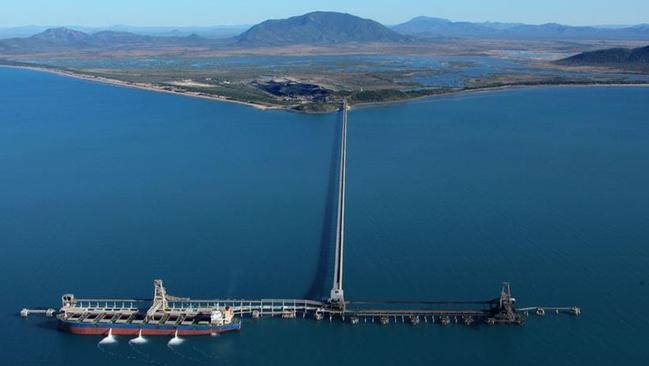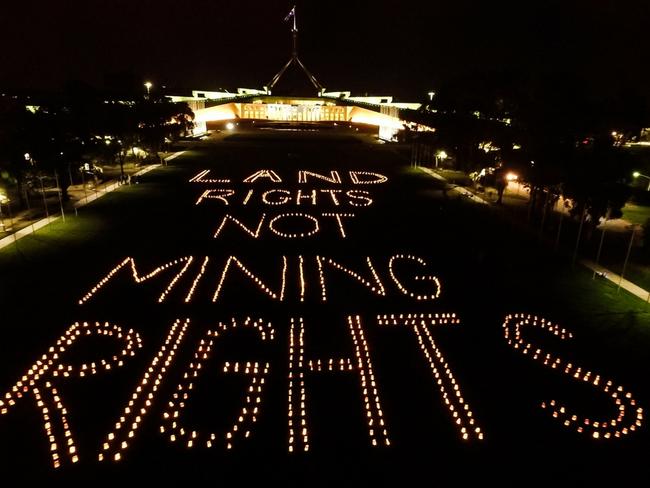‘Game changing’ few weeks ahead for Adani’s Carmichael mine as Australian Parliament considers native title bill
WHILE we’re all distracted with the Budget this week, the Turnbull Government looks set to remove the last legal hurdle to Adani’s $21 billion mine.

UPDATE: A decision on Adani’s mega coal mine looks to be delayed until June after changes to the Native Title Act were delayed in Parliament this week.
This week was expected to be a “game changer” for Adani’s mega coal mine as the Turnbull Government looked set to remove the last legal hurdle to its $21 billion project.
In a decision that was likely to be lost among coverage of the Budget on Tuesday, the Turnbull Government was due to consider whether to change native title laws and help mining companies get their projects off the ground.
The Native Title Amendment (Indigenous Land Use Agreements) Bill 2017 will make it easier for companies like Adani to sign Indigenous Land Use Agreements with native title groups.
The change in law was required because a Federal Court recently ruled that all members of the group had to approve of an agreement for it to be valid. The government wants to change this so only a majority of members have to agree.
The law change is important for Adani because its agreement did not get approval from all 12 families represented.
The bill has already passed the House of Representatives and was due to be considered in the Senate.
Shadow attorney-general Mark Dreyfus reportedly confirmed Labor would support the bill but the Senate was unable to vote on it due to opposition senators joining the Greens and Nick Xenophon Team to prevent debate being brought forward.
Greens Senator Rachel Siewert said the Greens would not be supporting the amendment because of limited consultation with Aboriginal and Torres Strait Islander people, as well as significant doubt over the operation of some of the measures.
Adani Australia chief executive Jeyakumar Janakaraj told The Courier Mail the native title law change was the only thing holding the project back.
He said would fly to India in a fortnight to ask the board for a financial decision, which should pave the way for construction to start in August.
“The next three weeks will be game changers for the Galilee Basin,’’ Mr Janakaraj said.
Although the amendment has not yet been signed, Adani seems confident it will go ahead and even signed a deal recently with Arrium’s Whyalla steelworks in South Australia for 54,000 tonnes of steel to build a 388km rail link.
But the potential law change has alarmed some indigenous groups.
On Sunday night, members of the Seed Youth Indigenous Climate Network gathered on the lawn of Parliament House to urge politicians not to support the bill.
“We’re highly concerned that changes to Native Title will be quietly rushed through Parliament this week while there is excess noise about the federal budget,” network co-director Larissa Baldwin said.
“The introduction of these amendments is a shameful attempt by the Turnbull Government to change the rules to suit their mates at Adani, and the mining lobby, at the expense of Aboriginal rights.

“These new changes to the Act will only serve to make it easier for mining companies to get their projects off the ground. It will undermine our ability to say no. But also make it harder for us to challenge dodgy deals in court.
“If this bill passes this week it will be a shameful day for the Turnbull Government, and a day our communities won’t forget.”
Members of the Wangan and Jagalingou Traditional Owners Council say they will continue to fight against the mine, regardless of whether the bill is passed.
“We intend to prosecute our case against Adani in the Courts come what may in Parliament next week,” the group said in a statement.
“We will expose Adani’s sham land use agreement and force the State Government to take responsibility for this shonky deal.”
Adani’s mine has been hugely controversial due to fears over its potential impact on the Great Barrier Reef.
Environment groups have been ramping up their campaign against the project, led by former Greens leader Bob Brown.
Protesters have been targeting the Commonwealth Bank, demanding that the bank rule out funding the project.
But the Turnbull Government has come out strongly in support of the mine, saying it would create jobs and provide electricity for the poor in India.
“It is vitally important to Queensland’s future, to Australia’s economic future,” Prime Minister Malcolm Turnbull said during a visit to India recently.
“If we stop exporting coal tomorrow all of the markets we sell coal to would simply buy it from somewhere else so it would not be one tonne less of coal burnt in the world.”

The government is currently considering whether to provide a $1 billion concessional loan to Adani to build a rail line from the mine in central Queensland to a waterfront coal terminal at Abbot Point.
But Labor has expressed concerns about taxpayer money going to fund the rail link.
There are also concerns over Adani’s environmental record in India. The company was fined $975,000 after a ship carrying its coal sank and caused an oil and coal spill along Mumbai’s coast.
In Australia recently, Adani was found to have breached sediment limits put on its temporary license to release water from its Abbot Point facility during Cyclone Debbie.
An investigation found sediment in the water released was eight times the allowable limit.
Queensland’s environment department is now considering whether to take action against Adani and the director general Jim Reeves said it was still investigating whether any of the sediment had leeched into nearby waterways.
Greens leader Richard Di Natale said the breach was the equivalent of “driving 300km/h in a school zone.”
“We just say to the federal government, who are proposing to hand over a billion dollars of taxpayer money, think very carefully before you do that,” Senator Di Natale told reporters in Brisbane last week.
“Stop that mine going ahead, because if that mine does go ahead, this is a taste of things to come.”
Queensland Conservation Council head Tim Seelig said the spill confirmed their fears.
“This case highlights that we need a review of the whole model of Temporary Emissions Licences, when this has been used to circumvent existing limits to environmental damage,” he said.
— With AAP



